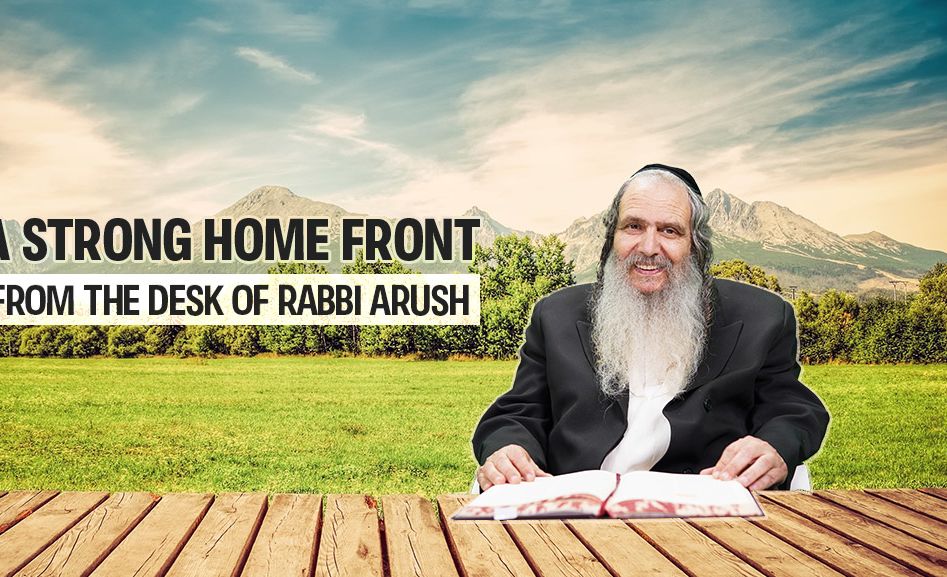
The Owner’s Manual for Couples
People frequently ask me, "What was Rebbe Nachman of Breslev's secret in life?" More specifically, they often ask, "What was Rebbe Nachman's key to peace...

People frequently ask me, “What was Rebbe Nachman of Breslev’s secret in life?” More specifically, they often ask, “What was Rebbe Nachman’s key to peace in the home?”
One answer suffices for both of the above questions: Rebbe Nachman never budged an iota from Halacha, or Jewish Law.
An automobile dealership tells new-car owners that their 5 year/ 50,000 mile warranty is contingent upon fulfilling all the necessary maintenance steps as prescribed in the owner’s manual. The owner’s manual was written by the manufacturer’s chief engineer, who knows better than anyone else what’s good for the car, because he designed it! So, if he instructs the new owner to use 10/40 motor oil in the car’s engine, yet the new owner wants to save money and fills the engine with Mazola Corn Oil that he bought on sale at the local supermarket, then he can forget about his warranty. The new car’s wrecked engine will be the negligent owner’s responsibility, not the manufacturer’s.
Hashem is the Designer and Chief Engineer of creation. If the human soul is one of Hashem’s most intricate creations, then strict adherence to the Designer and Chief Engineer’s instructions is mandatory for the soul’s health and happiness, in other words, for its proper functioning. The more sophisticated a creation is the more critical one must operate according to the owner’s manual. For example, one must be far more exacting in maintaining a $50 million jet aircraft than in maintaining a goat. The slightest mistake in tuning a supersonic aircraft could be fatal; its fuel, for example, must be highly refined and filtered. Yet, one doesn’t need to filter a goat’s food; it eats literally anything – briars, thistles, husks, and peels.
The human soul is far more sophisticated than an F-16. To operate efficiently, the soul must be activated according to its owner’s manual – the Torah. Since Halacha is the practical synopsis of Torah, it is the prerequisite for emotional, spiritual, and physical health.
If the human soul is one of Hashem’s most sophisticated creations, then the union of two souls in marriage is the most sophisticated creation. The slightest deviation of our sages’ instructions for maintaining a healthy, fruitful relationship and a home that radiates with peace, joy, and love will unfortunately yield the opposite effect.
Men and women are opposites. In our previous lesson, we mentioned the Zohar, which states that a husband resembles the sun and a wife resembles the moon. The sun and the moon are opposites, since the sun is inherently light while the moon is inherently dark, with no light of its own.
Rebbe Nachman of Breslov teaches (Likutei Moharan I:80) that one attains peace by connecting two opposites. Since men and women are opposites, one attains peace by connecting the man with his woman; their mutual commitment to observing Torah and its commandments are brought forth in Halacha is the only way to insure a healthy, lasting, and gratifying connection.
Everyone understands that a driver without a license not only endangers himself, but everyone else on the road as well. One can’t possibly obtain a driver’s license without proper training. Again, a more sophisticated piece of machinery – like a helicopter or an airplane – requires all the more training. Since the soul is so much more intricate than even a sophisticated jet aircraft, one must learn the basics of what constitutes a “lichtigge shtub” (Yiddish for “a radiant Jewish home”) in order to avoid fatal collisions. Any pilot will tell you that flying a plane is much easier than attaining marital bliss.
With the above in mind, let’s see what’s written inside our “owner’s manual” about our duties as husbands and wives (see Rambam, Hilchos Ishos, Chapter 15, statutes 16 – 20):
* Our sages command that a man shall not be without a wife, in order to avoid contemplation [of women]. Also, a woman shall not be without a husband, in order to avoid suspicion.
* Every man must jealously cherish his wife; he cannot do so unless he attains a spirit of holiness. He shall not coerce her, but act with her assent, through joy and open communication.
* A woman shall be modest, and shall not act ridiculously and light-headed in front of her husband. Her speech shall also be wholesome and modest. She shall not use marital relations as a weapon. She shall distance herself from ugly acts and from anything that resembles an ugly act.
* A man shall honor his wife more than he does his own body, and shall love her as he loves his own body. If he has monetary wherewithal, then he should freely spend money for her welfare according to the money at his disposal. He shall not scare her; he shall speak to her with kindness and shall not be sad or angry.
* The woman shall exceedingly respect her husband, and shall awe him. She shall do everything according to his will, and he shall be in her eyes like a king or a minister, adopting what is pleasing to him and casting away what is not pleasing to him.
The Rambam concludes his directives and says, “This is the way that the holy and pure sons and daughters of Israel shall bind together to form a pleasant and praiseworthy marriage.” In short, these are manufacturer’s instructions for a radiant home. Nevertheless, they are more than encapsulated; God willing, our future lessons will elaborate on particulars of the Rambam’s statutes while applying Rebbe Nachman’s teachings to contemporary practicality.
Disqualifier: This series is designed as food for thought and to provide practical guidelines for emotionally healthy people who are either married or contemplating marriage. It is not a substitute for the professional help required in situations of extreme emotional impairments and/or disturbances.








Tell us what you think!
Thank you for your comment!
It will be published after approval by the Editor.